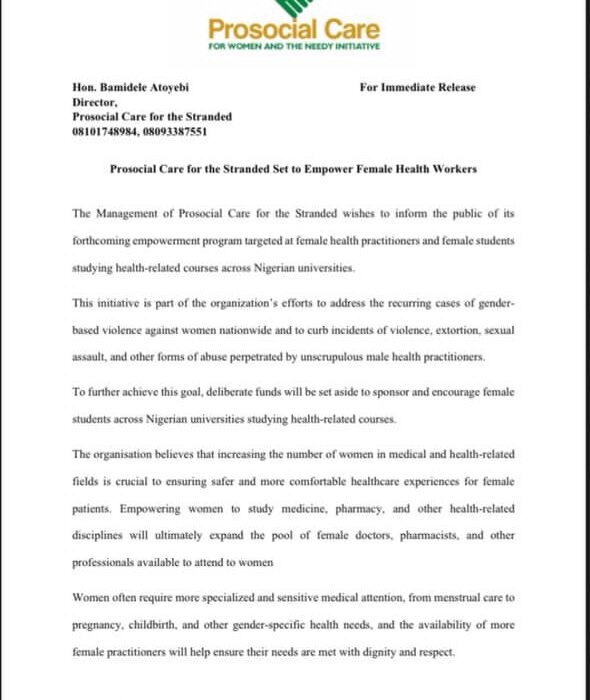Prosocial Care for the Stranded Set to Empower Female Health Workers

The Management of Prosocial Care for the Stranded wishes to inform the public of its forthcoming empowerment program targeted at female health practitioners and female students studying health-related courses across Nigerian universities.
This initiative is part of the organization’s efforts to address the recurring cases of gender-based violence against women nationwide and to curb incidents of violence, extortion, sexual assault, and other forms of abuse perpetrated by unscrupulous male health practitioners.
To further achieve this goal, deliberate funds will be set aside to sponsor and encourage female students across Nigerian universities studying health related courses.
The organisation believes that increasing the number of women in medical and health-related fields is essential to ensuring safer, more comfortable healthcare experiences for female patients. Empowering women to study medicine, pharmacy, and other health-related disciplines will ultimately expand the pool of female doctors, pharmacists, and other professionals available to attend to women.
Women often require more specialized and sensitive medical attention from menstrual care to pregnancy, childbirth, and other gender-specific health needs and the availability of more female practitioners will help ensure their needs are met with dignity and respect.
According to the World Health Organization, more than one-third of women have reported mistreatment during childbirth, including slapping, shouting, denial of pain relief, refusal of privacy, and other forms of abuse, with young and less-educated women identified as the most vulnerable.
Although Nigeria lacks a unified national database specifically tracking abuse perpetrated by medical practitioners, data from Sexual Assault Referral Centres (SARCs) and hospital-based studies reveal consistent reports of sexual assault, coercion, and neglect within healthcare settings. Many of these cases remain undocumented due to stigma and weak reporting mechanisms.
Additionally, many men have expressed discomfort with male practitioners treating their wives, daughters, and female relatives. While they often prefer female-to-female care, they are left with limited to no choice owing to the low number of female professionals currently in the field.
Prosocial Care for the Stranded is committed to changing this narrative by promoting the empowerment of women in healthcare, fostering safer clinical environments, and advocating for increased female representation across all health professions.









